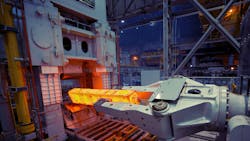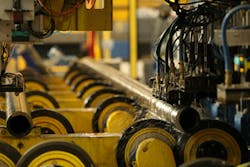After nearly two years of capital investment projected to top $500 million, the rewards are beginning to show for The Timken Company. The specialty steelmaker and producer of friction management and power transmission devices has brought on-line three projects intended to expand capacity and improve product quality for important markets, in particular oil-and-gas and industrial applications.
Timken v.p.-steel manufacturing Tom Moline said the long list of projects, some still in progress, support an overall effort to increase steel output for the Faircrest Steel plant in Canton, OH, which shipped 1 million tons in 2012. He indicated the new capacity and production efficiencies would add about 15% to Faircrest’s potential output.
The most notable new installation is a 3,300-ton forge press line. The automated open-die press is the only operation of its kind in North America, conceived as a sizing stage in Timken’s bar rolling process. It was designed by Mitsubishi Nagasaki Machinery Mfg. Co. Ltd.and installed at a reported cost of $35-million.
The purpose is to convert heated, special bar quality steel ingots weighing up to seven tons (and measuring 7 feet long and 28 inches in diameter) into 22-in. blooms. Those blooms are rolled into bars with more reliable “center soundness” across a wider cross section of SBQ products.
"The forge press opens new market spaces for customers and Timken,” according to said Rich Kyle, group president, “providing particular value where performance in extreme operating conditions is of critical importance.
"Adding this forging step prior to rolling further improves bar soundness,” Kyle explained. “The forge press also contributes substantially to our long-term competitiveness by bringing greater differentiation and expanded capacity for high-quality Timken products to customers worldwide."
Installation and Start-up
The forge press was completed in 2012 and started up in December. According to Tom Moline, the installation and start-up effort have been smooth, and the products are meeting with customers’ satisfaction.
Also started up recently (at Timken’s adjacent Gambrinus Steel plant, also in Canton) is an intermediate finishing line designed to make rolling more efficient by reducing product handling and movement. Timken noted it replaces a pickling (scale removal) stage in its rolling process with a more environmentally friendly water-jet descaling system.
A third start-up for Timken is a second induction thermal-treatment line. It introduces about 40,000 tons of capacity for normalized thermal treatment. Together with Timken’s previous heat-treating system, the line helps increases material throughput by increasing quench and temper capacity by 20,000 tons per year.
"The intermediate finishing and induction thermal treatment lines improve manufacturing effectiveness and underscore a long-standing commitment to advance our capabilities," according to Kyle added.
"With customers foremost in mind, we are investing more than $500 million in our Ohio steel plants to help us meet their needs."
Timken’s efforts to increase steelmaking capacity continue with plans for a new four-strand blooms caster and a second ladle refining station. The former is in the early construction stages, aiming toward a start up in the second half of 2014. Timken will continue to pour ingots as well as cast blooms, and the existing soaking furnace, inline forge press, and rolling mill will receive products from both sources.
The latter project is nearer completion. It will start up in 2Q 2013, increasing potential throughput from Timken’s electric melt shop.

